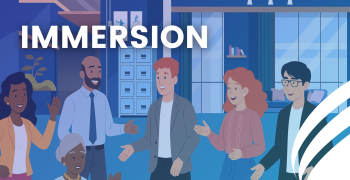
An essential tool in career evaluation is interest assessments, which significantly help in understanding an individual’s professional interests and guiding their career path according to their preferences. Synonymous with motivation, well-being, and self-fulfilment, these assessments offer true and meaningful answers to identify one's preferences and make their career a source of satisfaction and motivation.
When used correctly, they enhance the credibility of the professional conducting the career assessment. They add invaluable value to the support process through the accuracy of the information revealed and the quality of the reflections initiated. However, mastering the interpretation of these assessments and knowing how to interpret them is essential. Here are 3 mistakes to watch out for when using interest assessments:
Mistake #1: Taking the job suitability % at face value
"You have an 87% match with the accountant job, so it's meant for you!" These types of phrases are often said by career consultants. We need to remember that we are not measuring the performance rate of a machine but rather a human being, will all the complexity that entails. Interest assessments measure the potential alignment of an individual with professions they are likely to enjoy. The same goes for the support that must be provided to individuals seeking to develop their career paths based on these assessments.
So what is the use of these assessments? As we constantly emphasise, the assessment is primarily a guide and not a solution since it cannot capture the entirety of an individual's personality. The assessment offers the evaluator a fantastic method, both structured and information-rich, to identify areas that truly interest an individual. The results provide an objective basis for engaging in meaningful discussions about their professional aspirations, values and motivations. These assessments can speed up the decision-making process by narrowing down the number of options to consider and allowing evaluators to focus their efforts on providing more relevant career choices for their clients. And remember, you are the expert in the process and use of the assessment. The client is the expert on themselves and the protagonist of their life; the decision on their final career path ultimately is down to them.
Mistake #2: Rushing to look at job matches
Observe the reaction of clients when they receive their report: they are eager to see the list of suitable professions to finally have some clarity! They hope this assessment will guide them to the job of their dreams, the one they hadn't thought of, and that would change the course of their life! Stop! As mentioned above, you are the expert in the assessment process. What's the point of skimming through the list of professions without even understanding why this particular job is at the top of the list or why another one scores low? Candidates will only be more lost, and this exercise would be of no value.
Before exploring the list, you must focus on developing self-awareness with your client. They need to know what excites them, what they no longer like, what explains their past choices, what they need now, in what way, in what environment, and under what conditions. In short, they need to know themselves, and it's only by doing this work of understanding the self that these job matches will make sense. Professionals have several methods at their disposal to help clients make the most of the information shown by the assessment to become aware of their interests and foster a better understanding of themselves, which is a fundamental step in career choices.
Mistake #3: Misinterpreting the RIASEC results
We often hear: "I know the RIASEC assessment!" But let's set the record straight: RIASEC is not an assessment. It's a model used to construct the assessment. To interpret this model correctly, the famous principle "the whole is greater than the sum of its parts" truly applies. Too many professionals focus on one factor at a time, thinking that by dissecting it well, the clients will know themselves better. However, it's the combination of these factors that brings out the full essence of a profile. Let's look at an example.
Knowing that one is creative and drawn towards developing original ideas, helps us to appreciate their Artistic profile. Also, knowing that one enjoys being physical and working with tools on concrete projects informs their Realistic interests. But, it is far more relevant to combine these two interests to push the analysis into another dimension and generate new information. In this case, by associating the Artistic and the Realistic factors together, the candidate might appreciate their ability to visually conceptualise objects from a technical perspective or come up with various ideas for designing a new space. They could become aware of their unique work methods, which blend with creativity, patience, thoroughness, and ingenuity. Discussions could also include their interests in manual tasks that appeal to their artistic flair, their skills in working with various materials to bring their ideas to life, or their knack for knowing how to refurbish objects.
To make the most of interest assessments, they must be integrated into the career assessment process, by linking the information to the individual's background and combining it with other evaluation tools. Generally, it is suggested that interest assessments are complemented with personality assessments. While interest assessments reveal an individual's preferences and what motivates them, personality assessments focus on identifying their traits and behaviours. That is, what they do naturally and what aligns with their abilities.





